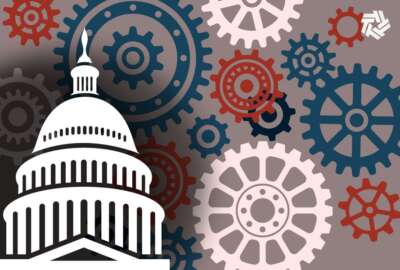

Federal Chief Information Officer Clare Martorana said the guidance will help agencies understand how to implement the law that called for them to modernize...
First, there as the pandemic. Then, there was the change in administration. At the same time, there were several high profile cyber threats to deal with.
But the time has come to put the 21st Century IDEA Act, passed and signed into law in 2018, to the front of the priority list.
The Office of Management and Budget finally is ready to issue implementation guidance for the nearly four-plus-year-old law.
Federal Chief Information Officer Clare Martorana said yesterday the new guidance will hopefully come out this summer, following a similar path as the zero trust guidance from 2022, which came out in draft first giving industry and agencies the chance to offer feedback.

“If you haven’t read the law, read it. It’s only four pages. It’s four pages of incredible guidance for a journey that most of us have been in many organizations across government,” Martorana said at the Federal Tech Industry Day at the Labor Department in Washington. “Our guidance is only the first step in spurring on this ongoing innovation. It is my statutory responsibility in the Office of the Federal CIO to put out this guidance, to make sure agencies understand that we have convened people around the table to influence the guidance so we are connecting policy to implementation and it helps people on the ground.”
Martorana said the new guidance will amplify the customer experience executive order President Joe Biden signed in December 2021. Over the past two years, and really starting with the pandemic, agencies have started to move out on a lot of the goals of the 21st Century IDEA Act.
The Labor Department, for example, implemented digital signatures for two forms in the Office of Workers’ Compensation Program.
Martorana said agencies have an opportunity to learn from what others have already done over the last few years.
“I think we will move much more rapidly [today] than if we were just starting at 2018 point, and we just got the law passed,” she said. “The 21st Century IDEA Act gave us a lot of specificity. What we needed to do is translate that, so that agencies can comprehend it, architect it and make sure that they’re really understanding what the law is asking for. Then they can ingest it into their own process, do their own user research, develop it and make sure it’s architected within the systems that they operate. Because every agency is on their own journey and they’re in their own place, there’s no two agencies that are equally forward leaning in their benefits delivery to the public. It’s very uneven, and hopefully the 21st Century IDEA Act will bring us all moving forward together.”
The delay in issuing guidance to this seemingly simple, but complex law is complicated.
Martorana said the delays in the guidance aren’t because of any one reason, but due to several competing and ongoing priorities.
“We haven’t driven people to utilize the US web design system in a way that we should, can and must, so that we have uniformity as people were going on a journey across. I think we’re also in a different time of trust and verification. We have a lot of disruption to the search ecosystem, especially with ChatGPT. You can’t go an hour without hearing those words uttered. We have a real opportunity in government to clean up our environment because we do have a lot of content that has not been retired and is in those learning models, so it really is incumbent upon us to focus on making sure that we are providing the public the right answer, and doing it in a seamless way as we possibly can,” she said. “We feel like the guidance is setting us all on a path so that we can share standards. We need brand standards. We need content standards. We need really implementation standards. I think that’s an area where I see us learning from each other, taking all of this innovation that is going on in government and leapfrogging ourselves.”
Suzette Kent, the federal CIO when Congress passed the IDEA Act in 2018, said because the law directed shared responsibilities across many agencies, it was a matter of everyone coming together to do their part. That, she said, created a longer timeline for the guidance.
“I hope the upcoming guidance addresses some of the mismatch in how we collect and use data,” Kent said at the Federal Tech Industry day. “The Paperwork Reduction Act should be examined to have a more modern way of collecting and leveraging data across the government.”
Kent added that OMB did issue initial requirements around the IDEA Act requiring agencies to meet certain aspects of the law, including drafting plans to broaden the use of electronic signatures and a website modernization strategy.
Other parts of the law, however, were hung up by more immediate priorities, as well as delays in developing website design standards. The General Services Administration published them in January 2020.
The fact OMB is closer to the guidance pleased lawmakers, who have pushed OMB to get the memo out the door.
Rep. Gerry Connolly (D-Va.), one of the co-sponsors of the bill, said in a statement to Federal News Network, “Many in Congress, including myself, have waited almost four and a half years for this highly anticipated implementation guidance. We eagerly look forward to this next step to improve online accessibility and bring our government fully into the 21st Century.”
Connolly, Rep. Ro Khanna (D-Calif.), the author of the law and several other lawmakers wrote to OMB in May 2021 asking about the status of the implementation guidance.
Martorana said OMB expects to use a similar process to get the guidance out that is used with the zero trust memo last year that included the release of a draft guidance to gain feedback from private sector and academia experts.
“We’re in the process right now of finalizing our drafts, having incorporated some technologists into the review process, along with all of our privacy colleagues and our general counsel colleagues, so we’re hoping this summer we are pushing really hard to get this out,” she said. “We’re actually working on that rollout plan right now. The more voices, the better for us to be able to get what we need. We need industry insight into this because we work with our commercial partners to deliver much of the technology and government. We do want to make sure we’re convening the right people and not just having a narrow perspective on [the topics].”
Copyright © 2025 Federal News Network. All rights reserved. This website is not intended for users located within the European Economic Area.
Jason Miller is executive editor of Federal News Network and directs news coverage on the people, policy and programs of the federal government.
Follow @jmillerWFED




